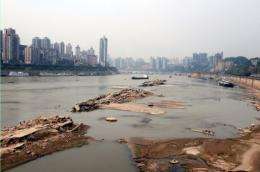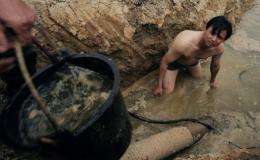The dried up banks of the Yangtze River in southwest China are seen earlier this month. Chinese factories are facing curbs on electricity use as coal prices soar and a severe drought hits hydropower plants, state media have said, with possible major shortages ahead this summer.
Chinese factories are facing curbs on electricity use as coal prices soar and a severe drought hits hydropower plants, state media have said, with possible major shortages ahead this summer.
The situation has highlighted the difficulties faced by China, the world's largest energy consumer, as global fuel prices climb and the country battles soaring inflation.
Businesses in coastal areas and some inland provinces have grappled with power cuts and full blackouts since March due to surging demand and a drop in hydroelectric output, the China Daily said.
The shortage -- the worst since 2004 -- is likely to get worse in the summer when demand peaks, with coastal Jiangsu, an export powerhouse neighbouring Shanghai, the hardest hit, it said.
Power supplies could be as much as 16 percent lower than the province needs, it said.
The drought plaguing central China for months has left more than one million people without proper drinking water and crimped output of hydroelectric power, China's second-biggest energy source, previous media reports said.
Since Sunday, water levels at nearly 1,400 reservoirs in Hubei province have fallen below the operational level, the China Daily said on Wednesday, citing government figures.
Even water levels at the Three Gorges Dam -- the world's largest hydropower project -- have dropped below the level needed for full power generation, it added.
Many factories in Zhejiang province on the east coast have already been forced to suspend production every three days to conserve energy. Similar measures were enforced in the central province of Hunan and other areas, the newspaper said.
State media said on Wednesday that the central government planned to raise prices paid by utility companies for electricity in several affected provinces in a bid to boost the flagging bottom lines of power producers.
Chinese farmers dig a new well at their farm in Huangpi, in central China's Hubei province. The drought plaguing central China for months has left more than one million people without proper drinking water, according to media reports.
Consumer prices will remain unchanged for now.
Power authorities in Shanghai have also decided to impose electricity rationing at the production site of Baosteel Group Corp, China's largest steelmaker, between June and September, it said.
Analysts also attributed the power crunch to surging coal prices, which have discouraged thermal power producers from increasing output since utility prices are kept low by the government, which is struggling to curb rising consumer costs.
The drought in central provinces may further fan inflationary pressures, as grain and fish output in those areas are expected to decrease significantly, they said, according to Chinese media reports.
China's consumer price index, which is a key gauge of inflation, rose 5.3 percent on year in April -- a slight easing from a 32-month high of 5.4 percent in March but well above Beijing's four percent target for 2011.
The government, ever wary of surging inflation's potential to trigger social unrest, has taken a series of measures to rein in soaring prices, including a ban on diesel exports to keep fuel costs in check.
(c) 2011 AFP
























